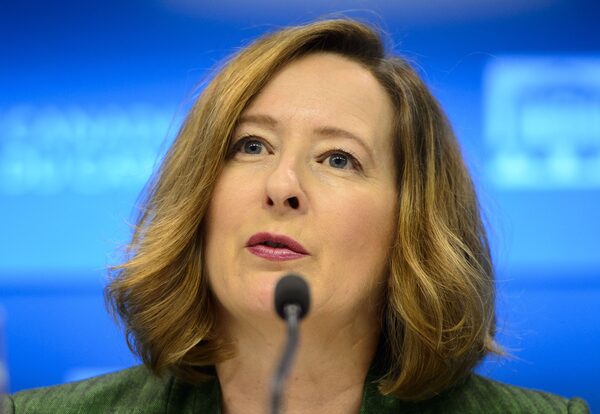
Senior Deputy Governor Carolyn Wilkins answers a question during a press conference at the Bank Of Canada in Ottawa in this file photo from May 16, 2019. Wilkins, the second-in-command at the Bank of Canada, says maintaining the independence of the central bank will be key to aiding the economy during and after the COVID-19 pandemic.Sean Kilpatrick/The Canadian Press
Bank of Canada senior deputy governor Carolyn Wilkins pledged that the central bank won’t let its eye drift from its inflation target, even as its aggressive market-liquidity measures in the COVID-19 crisis have more than tripled its balance sheet in a matter of weeks.
In text prepared for a speech Monday on a private teleconference, Ms. Wilkins also indicated that the bank’s market-supporting actions, which include buying federal government bonds at a time when the government is taking on heavy debt to finance COVID-19 aid programs, won’t compromise the central bank’s independence.
“Whether it’s a risk of inflation or deflation, central bank credibility is critical. This requires keeping our eye on the ball in terms of our mandate, and retaining the operational independence to achieve it,” she said.
“The inflation-control target agreement between the bank and the federal government has been the cornerstone of our operational independence for almost three decades. Our new programs align with this agreement because they are helping to lessen financial hardship today and paving the way to a sustainable recovery.”
The teleconference, a private event put on by the C.D. Howe Institute, an economic think tank, comes just three days after Finance Minister Bill Morneau named former senior Bank of Canada official Tiff Macklem as the bank’s new governor. It was a surprise choice that passed over Ms. Wilkins, who had long been considered the favourite to succeed Stephen Poloz when his seven-year term in the job expires June 2.
The event was closed to reporters, and the C.D. Howe Institute has a standing rule that all comments made in its private events are considered off the record. The Bank of Canada made the speech available on its website, but reporters did not have access to any post-speech discussion. The speech itself made no reference to the competition for the governorship, or to Mr. Macklem’s selection.
The government has been buying a minimum of $5-billion a week of federal government bonds since the beginning of April, in an effort to provide stability and liquidity to the government bond market, which serves as the foundation of the credit market serving governments, businesses, consumers, and the financial industry. It has pledged to continue the buying until an economic recovery is “well under way.”
Ms. Wilkins reiterated that the central bank is willing to change tack on its asset-purchasing programs – to shift the goal to economic stimulus from “solely market functioning” – should that be deemed necessary during the postlockdown recovery, repeating a pledge the bank made in its mid-April Monetary Policy Report.
She noted that as a result of the bond purchases, as well as a host of other asset-buying programs in provincial, corporate and mortgage funding markets that the bank has undertaken to provide much-needed market liquidity, the Bank of Canada’s balance sheet has swelled to about $385-billion as of last week, from about $120-billion at the beginning of March. However, she said the central bank will be able to ensure that the injection of such a large amount of funds into the banking system won’t trigger “runaway inflation” as the economy recovers, noting that the bank’s 2-per-cent inflation target remains its primary objective.
She said that “close to 90 per cent” of the increase of the balance sheet to date are short-term assets that will mature in a year or less, meaning that “a good part of the increase in the balance sheet will run off naturally” as the expected economic recovery takes hold.
Ms. Wilkins also noted that the Bank of Canada has obtained “indemnity agreements” with the federal government on its bond-purchase programs, a common move by other central banks with such asset-purchase programs to protect themselves against losses.
“This provides additional assurance that our use of these programs will remain closely tied to the bank’s inflation control objective,” Ms. Wilkins said.
“We will be transparent about our operations – that includes being clear on the parameters of our programs and reporting on our holdings on a regular basis,” she added.
Your time is valuable. Have the Top Business Headlines newsletter conveniently delivered to your inbox in the morning or evening. Sign up today.
 David Parkinson
David Parkinson